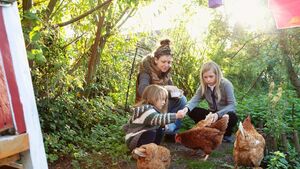Living Greener: The trials and triumphs of rearing chickens

Photo for illustrative purposes only
BY the time my daughter was seven, we had spent years gardening and foraging together, and now we felt ready to keep animals.
We put up a chicken fence, hammered a coop together, and rather than buying paint with all its toxic unpronounceables, I learned how to mix water with lime powder and make whitewash.
I tried to show her how to paint the walls, but soon gave up and let her exult in her more Jackson-Pollack-inspired technique.
When their home was ready, we picked up the chickens from a nearby farm and brought them home in a box, my daughter cuddling and reassuring them all the way.
It took only a day’s play for her to give them all names, learn their personalities, and advise me on which ones to watch out for.
“Look at the scratch Marge gave me!” she said one day, holding out her hand.
That’s impressive, I said. Marge and Trudy are the troublemakers, aren’t they?
“It’s Marge doing it!” my daughter said. “Trudy’s not really bad at heart – Marge just drags her along and gets her in trouble. Trudy’s like Peter Lorre in Arsenic and Old Lace.”
Before getting our chickens, I wanted to learn and avoid all the most common mistakes, which enabled me to make an entirely different set of mistakes.
The books never mentioned, for example, that chickens don’t realise that different parts of you are all part of the same animal – so don’t walk around them in sandals, or you get what my daughter and I took to calling “the full Hitchcock.” One of our chicks late-bloomed into a rooster, who ... raised questions for a child. All day. Not consensually. He also darted out of the chicken run whenever we opened the door a crack, rather than just staying where the food and sex were, leading to a frantic chase around the property.
The first time I grabbed him, I thought I could simply let him go over the fence, and he would flutter gently to the ground like the bird he was. Instead, he dropped like a bowling ball into the mud and crowed angrily at us all day from behind the fence.
One night, one of ours went missing, and we scoured the nearby woods for an hour and found nothing. Just as we were giving up, I noticed a hole next to the coop that led to a tunnel, and poking down it with a broomstick we heard a “BWAK!”.
The hen apparently started scratching the ground and didn’t stop until she was underground, and then panicked when she remembered she was a bird. I eventually fished her out, and my daughter cheered and embraced the prodigal idiot.
Chickens were well worth the trouble, though, as they gave us pest control, lawn-mowing, garbage disposal, fertiliser, entertainment, and business ends doled out daily concentrated protein. They did seem determined to lay that protein everywhere but the coop, though, so every morning was like Easter, and on Easter morning, my daughter found twice as many eggs as I hid.
We tried ducks as well, less successfully. Of course, they needed water, and the canal that ran past our property offered that and plenty of food; the only problem was how to get them to come back to our house and lay eggs.
Our neighbours had done this, training their ducks to think of their coop as the place to sleep and lay. Their ducks waddled down the road to the canal every morning, fed themselves, and waddled back in the evenings to lay their eggs for my neighbours’ breakfast table. They never strayed; I used to tell delivery drivers to “turn right at the ducks”.
My daughter and I tried to follow their careful instructions, luring the ducks a little further out every day with food and then luring them back every evening. We did this for weeks, hoping we were building an understanding with the birds.
Once in the canal, however, they made a beeline for the far bank and stayed there, laughing at us in the distance.
My daughter looked dejected, but I put my arm around her and reassured her that they are home now, where they want to be, and we’ll see them every day. I’m sure they’ll be all right.
"But I worry about them out there, Daddy," she said solemnly. She leaned close. "They're really dim. And that's by duck standards."





